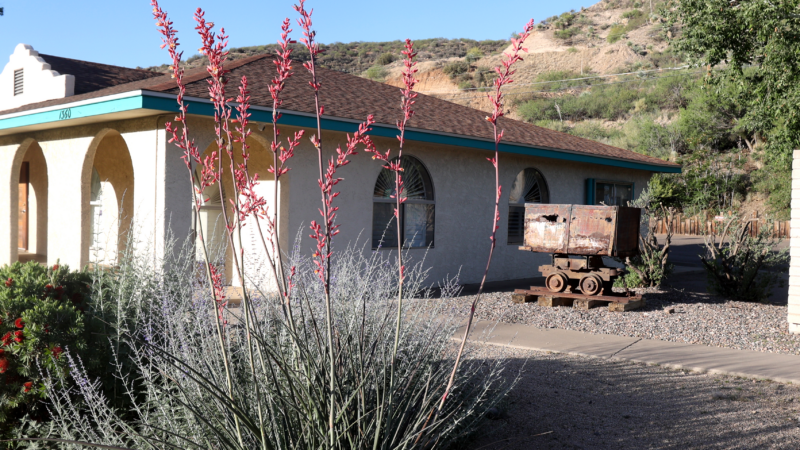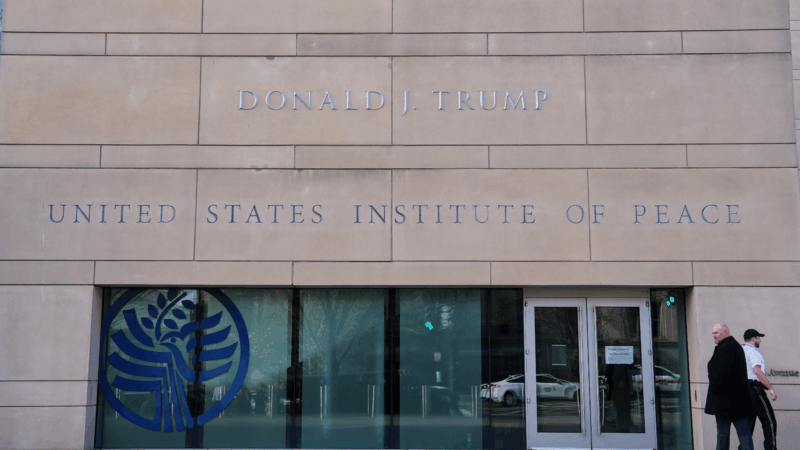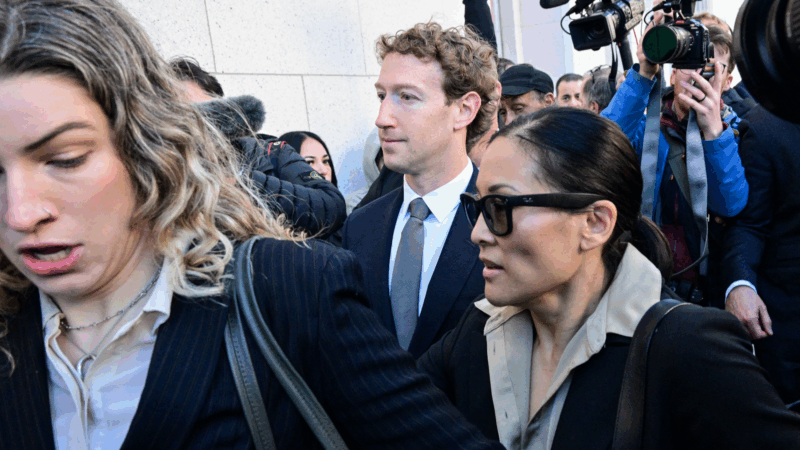In a county that backed Trump, people depend on Medicaid and are conflicted about cuts
GLOBE, Ariz. — Like many residents of this copper-mining town in the mountains east of Phoenix, Debbie Cox knows plenty of people on Medicaid.
Cox, who is a property manager at a real estate company in Globe, has tenants who rely on the safety-net program. And at the domestic violence shelter where she volunteers as president of the board, Cox said, staff always look to enroll women and their children if possible.
But Cox, who is 65, has mixed feelings about Medicaid.
“It’s not that I don’t see the need for it. I see the need for it literally on a weekly basis,” she said. “I also see a need for revamping it significantly because it’s been taken advantage of for so long.”
It wasn’t hard to find people in Globe like Cox with complicated views about Medicaid.

Gila County, where Globe is located, is a conservative place — almost 70% of voters went for President Donald Trump in November. And concerns about government waste run deep.
Like many rural communities, it’s also a place where people have come to value government health insurance. The number of Gila County residents on Medicaid and the related Children’s Health Insurance Program has nearly doubled over the past 15 years, according to data from the Georgetown University Center for Children and Families. Today, almost 4 in 10 residents are on one of the health insurance plans for low- and moderate-income people or those with disabilities.
So, since House Republicans passed plans to cut roughly $716 billion from Medicaid, the national debate taking place over the program hits close to home for many Globe residents, even as some welcome the prospect of tighter rules and less government spending.
For a rancher
For Heather Heisler, the stakes are high. Her husband has been on Medicaid for years.
“We’re ranchers, and there’s not much money in ranching,” said Heisler, who gets her own health care from the Indian Health Service. “Most people think there is, but there isn’t.”
Heisler was selling handicrafts outside the old county jail in Globe on a recent Friday night when the town hosted a downtown street fair with food trucks and live music.
She said Medicaid was especially helpful after her husband had an accident on the ranch. A forklift tipped over, and he had to have part of his left foot amputated.
“If anything happens, he’s able to go to the doctor,” she said. “Go to the emergency room, get medicines.”
She shook her head when asked what would happen if he lost the coverage. “It would be very bad for him,” she said.
Among other things, the “Big, Beautiful Bill” passed by House Republicans would require working-age Medicaid enrollees to prove they are employed or seeking work. The bill, which has advanced to the Senate, would also mandate more paperwork from people to prove they’re eligible.
Difficult applications can dissuade many people from enrolling in Medicaid, even if they’re eligible, researchers have found. And the nonpartisan Congressional Budget Office estimates more than 10 million people will likely lose Medicaid and CHIP insurance under the House Republican plan.
That would reverse big gains made possible by the 2010 Affordable Care Act that has allowed millions of low-income, working-age adults in places like Globe to get health insurance.
More people with health insurance
Nationally, Medicaid and CHIP have expanded dramatically over the past two decades, with enrollment in the programs surging from about 56 million in 2005 to more than 78 million last year, according to federal data.
“Medicaid has always played an important role,” said Joan Alker, who runs the Georgetown University Center for Children and Families. “But its role has only grown over the last couple of decades. It really stepped in to address many of the shortcomings in our health care system.”
That’s particularly true in rural areas, where the share of people with disabilities is higher, residents have lower incomes, and communities are reliant on industries with skimpier health benefits such as agriculture and retail.
In Globe, former mayor Fernando Shipley said he’s seen this firsthand.
“A lot of people think, ‘Oh, those are the people that aren’t working.’ Not necessarily,” said Shipley, who operates a State Farm office across the road from the rusted remains of the Old Dominion copper mine. “If you’re a single parent with two kids and you’re making $20 an hour,” he added, “you’re not making ends meet. You’ve got to pay rent; you’ve got to feed those kids.”

Not far away, at the local hospital, some low-wage workers at the registration desk and in housekeeping get health care through Medicaid, chief financial officer Harold Dupper said. “As much as you’d like to pay everyone $75,000- or $80,000-a-year, the hospital couldn’t stay in business if that was the payroll,” he said, noting the financial challenges faced by rural hospitals.
The growing importance of Medicaid in places like Globe helps explain why Republican efforts to cut the program face so much resistance, even among conservatives.
“There’s been a shift in the public’s attitude, and particularly voters on the right, that sometimes government plays a role in getting people health care. And that’s OK,” said pollster Bob Ward. “And if you take away that health care, people are going to be angry.”
Ward’s Washington, D.C., firm, Fabrizio Ward, polls for Trump, among other clients. He also works for a coalition trying to protect Medicaid.
At the same time, many of the communities where Medicaid has become more vital in recent years remain very conservative politically.
More than two-thirds of nearly 300 U.S. counties with the biggest growth in Medicaid and CHIP since 2008 backed Trump in the last election, according to a KFF Health News analysis of voting results and enrollment data from Georgetown. Many of these counties are in deep-red states such as Kentucky, Louisiana, and Montana.
Voters in places like these are more likely to be concerned about government waste, polls show. In one recent national survey, 75% of Republicans said they think waste, fraud, and abuse in Medicaid is a major problem.
The actual scale of that waste is hotly debated, though many analysts believe relatively few enrollees are abusing the program.

Nevertheless, around Globe, Republican arguments that cuts will streamline Medicaid seemed to resonate.
Retiree Rick Uhl was stacking chairs and helping clean up after lunch at the senior center.
“There’s a lot of waste, of money not being accounted for,” Uhl said. “I think that’s a shame.”
Uhl said he’s been saddened by the political rancor, but he said he’s encouraged by the Trump administration’s aggressive efforts to cut government spending.
Back at the street fair downtown, David Sander, who is also retired, said he doubted Medicaid would really be trimmed at all.
“I’ve heard that they really aren’t cutting it,” Sander said. “That’s my understanding.”
Sander and his wife, Linda, were tending a stall selling embroidery that Linda makes. They also have a neighbor on Medicaid.
“She wouldn’t be able to live without it,” Linda Sander said. “Couldn’t afford to have an apartment, make her bills and survive.”
KFF Health News is a national newsroom that produces in-depth journalism about health issues and is one of the core operating programs at KFF — the independent source for health policy research, polling, and journalism.
Transcript:
MARY LOUISE KELLY, HOST:
Gila County, Arizona, went big for Donald Trump and backed the president 2 to 1 in last year’s election. The county also relies a lot on Medicaid, the federal health insurance program that Trump’s Republican allies in Congress are looking to cut. Well, that makes for some complicated feelings about Medicaid. Noam Levey with our partner KFF Health News reports.
NOAM LEVEY: Globe, Arizona, is an old copper mining town about 90 miles over the mountains from Phoenix. Down by the former train depot, there’s a street festival every month with food trucks and live music.
(SOUNDBITE OF MUSIC)
LEVEY: I visited to find out what people in a conservative place like this thought about the Medicaid debate in Washington. House Republicans just advanced a plan to cut more than $700 billion from the safety net program.
Can I interrupt you guys for a second?
HEATHER HEISLER: Sure.
LEVEY: I’m a health care reporter from Washington, D.C.
It wasn’t hard to find people who were on Medicaid or knew someone who was. Heather Heisler’s husband has relied on the program for years.
HEISLER: We’re ranchers, and there’s not much money in ranching. Most people think there is, but there isn’t.
LEVEY: Heisler was selling crafts at the festival. She says Medicaid was especially helpful after her husband had an accident. A forklift tipped over and part of his left foot was amputated.
HEISLER: If anything happens, he’s able to go to the doctor, he’s able to go to the emergency room, get medicines.
LEVEY: And if he lost the coverage?
HEISLER: Oh, we would – it would be very bad for him.
LEVEY: GOP lawmakers want to put work requirements on some Medicaid enrollees and make people file more paperwork to prove they’re eligible. The result, according to the nonpartisan Congressional Budget Office – 10 million people will likely lose Medicaid insurance. In Gila County, close to 4 in 10 residents are on Medicaid and the related children’s health insurance program. That’s nearly double what it was 15 years ago.
FERNANDO SHIPLEY: And a lot of people think that, oh, well, those are the people that aren’t working. Not necessarily.
LEVEY: Fernando Shipley runs a State Farm office in town. He’s a city council member and former mayor.
SHIPLEY: If you’re a single parent with two kids and you’re making $20 an hour, you’re not making ends meet. You got to pay rent. You got to feed those kids.
LEVEY: The growing importance of Medicaid to places like Globe, Arizona, helps explain why congressional Republicans face so much resistance to their proposed cuts. Bob Ward has been polling for a coalition trying to protect Medicaid. His firm also works for Trump.
BOB WARD: There’s been a shift in the public’s attitude and particularly, you know, voters on the right that sometimes government plays a role in getting people health care, and that’s OK. And if you take away that health care, people are going to be angry about it.
LEVEY: Back in Globe, I found people who might be OK with some cuts to Medicaid. I met Debbie Cox at her property management office just outside downtown. The squat building is by a McDonald’s on a busy road where trucks roll by every few minutes.
DEBBIE COX: Service First Realty. OK, go ahead.
LEVEY: She was wrapping up some calls on a Friday afternoon.
COX: Would you give me a call next week? ‘Cause I need to start and do a walk-through inspection.
LEVEY: Cox has tenants who rely on Medicaid. And at the domestic violence shelter where Cox is president of the board, she says staff always look to enroll women and their kids. Still, she has mixed feelings about the program.
COX: It’s not that I don’t see the need for it. I see the need for it literally on a weekly basis. But I also see a need for revamping it significantly because it’s been taken advantage of for so long.
LEVEY: How many people are actually taking advantage of Medicaid and how much waste there is in the program are hotly debated. But to retiree Rick Uhl, the problems feel real. I caught up with him at the Globe Senior Center as he was stacking chairs after lunch.
RICK UHL: There’s a lot of waste, of money not being accounted for, and I think that’s a shame.
LEVEY: Downtown at the fair, I talk to David Sander and his wife Linda about Republican plans for Medicaid.
DAVID SANDER: I’ve heard that they really aren’t cutting it. Now, some people want to have more money spent, and they’re not going to spend that much, but they’re actually not cutting back. That’s my understanding.
LEVEY: The Sanders have a neighbor on Medicaid. Linda says the neighbor wouldn’t be able to live without the program.
LINDA SANDER: Couldn’t afford to have an apartment, make her bills and survive.
LEVEY: Her fate and the fate of millions of others who rely on Medicaid now hang on what Congress decides 2,000 miles away in Washington.
In Globe, Arizona, I’m Noam Levey.
Iran and the U.S. lean into gunboat diplomacy as nuclear talks hang in balance
Iran and the United States leaned into gunboat diplomacy Thursday, with Tehran holding drills with Russia and the Americans bringing another aircraft carrier closer to the Mideast.
Former South Korean President Yoon receives life sentence for imposing martial law
Former President Yoon Suk Yeol was sentenced to life in prison for his brief imposition of martial law in December 2024.
José María Balcázar becomes Peru’s eighth president in a decade
José María Balcázar has become Peru's new interim president, replacing another interim leader who was removed over corruption allegations just four months into his term.
Trump gathers members of Board of Peace for first meeting, with some U.S. allies wary
President Donald Trump will gather Thursday with representatives from more than two dozen countries that have joined his Board of Peace, for a meeting that will focus on the reconstruction of Gaza.
With a win over Sweden, the U.S. men’s hockey team will play for an Olympic medal
A thrilling overtime goal by defenseman Quinn Hughes puts Team USA through to a semifinal game against Slovakia. On the other side of the bracket, Canada had its own close call, but moves on to face Finland.
Zuckerberg grilled about Meta’s strategy to target ‘teens’ and ‘tweens’
The billionaire tech mogul's testimony was part of a landmark social media addiction trial in Los Angeles. The jury's verdict in the case could shape how some 1,600 other pending cases from families and school districts are resolved.







